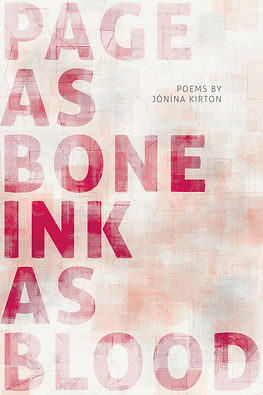
Jónína Kirton
Icelandic Métis Poet, Author
& Manuscript Consultant

Photo of Jónína Kirton, taken at Native Education Centre by Tim Matheson. Description: grey-haired woman with shoulder length hair, wearing a blue jean shirt with her hands raised mid clap and a look of sheer delight on her face.

Photo of Jónína Kirton taken in iceland, outside the home of the Icelandic president. Description: grey-haired woman with shoulder length hair, wearing a red wool coat in front of red and white home.

Photo taken at the Vancouver Mayor's Arts Awards in 2016. Jónína is sitting with her two writing mentors, Betsy Warland and ingrid rose. Betsy won the Vancouver Mayor's Arts Award in the Literary Arts and Jónína received the Emerging award in the same category.
I am available for readings, festivals and presentations.
I can be reached using the form below.
BOOKS
by
Jónína Kirton
An Honest Woman by Jónína Kirton confronts us with beauty and ugliness in the wholesome riot that is sex, love, and marriage. From the perspective of a mixed-race woman, Kirton engages with Simone de Beauvoir and Donald Trump to unravel the norms of femininity and sexuality that continue to adhere today.
Kirton recalls her own upbringing, during which she was told to find a good husband who would “make an honest woman” out of her. Exploring the lives of many women, including her mother, her contemporaries, and well-known sex-crime stories such as the case of Elisabeth Fritzl, Kirton mines the personal to loosen the grip of patriarchal and colonial impositions.
An Honest Woman explores the many ways the female body is shaped by questions that have been too political to ask: What happens when a woman decides to take her sexuality into her own hands, dismissing cultural norms and the expectations of her parents? How is a young woman’s sexuality influenced when she is perceived as an “exotic” other? Can a woman reconnect with her Indigenous community by choosing Indigenous lovers?
Daring and tender in their honesty and wisdom, these poems challenge the perception of women’s bodies as glamorous and marketable commodities and imagine an embodied female experience that accommodates the role of creativity and a nurturing relationship with the land.
Death, desire, and divination are the threads running through Jónína Kirton’s debut collection of poems and lyric prose. Delicate and dark, the pieces are like whispers in the night – a haunted, quiet telling of truths the mind has locked away but the body remembers. Loosely autobiographical, these are the weavings of a wagon-goddess who ventures into the double-world existence as a mixed-race woman. In her struggle for footing in this in-between space, she moves from the disco days of trance dance to contemplations in her dream kitchen as a mother and wife.
With this collection, Kirton adds her voice to the call for the kind of fierce honesty referred to by Muriel Rukeyser when she asked, What would happen if one woman told the truth about her life? The world would split open. Kirton tells her truth with gentleness and patience, splitting the world open one line at a time.
Books
2015
2017
2022
Jónína Kirton, an Icelandic and Red River Métis poet was born in Portage la Prairie, Manitoba, Treaty 1, the traditional lands of the Anishinaabe, Cree, Oji-Cree, Dakota, Dene peoples and the homeland of the Métis. She graduated from the SFU Writer's Studio in 2007 and since that time has published three books with Talonbooks. She was sixty-one when she received the 2016 Vancouver’s Mayor’s Arts Award for an Emerging Artist in the Literary Arts category. Her second collection of poetry, An Honest Woman, was a finalist in the 2018 Dorothy Livesay Poetry Prize. Her third book, Standing in a River of Time, was released in 2022. It merges poetry and lyrical memoir to take us on a journey exposing the intergenerational effects of colonization on her Métis family. She currently lives in New Westminster BC, the stolen Land of many Coast Salish Nations including the S’ólh Téméxw (Stó:ló), Qayqayt, šxʷməθkʷəy̓əmaɁɬ təməxʷ (Musqueam), səl̓ilwətaɁɬ təməxʷ (Tsleil-Waututh), Semiahmoo, Kwantlen, sq̓əc̓iy̓aɁɬ təməxʷ (Katzie), sc̓əwaθenaɁɬ təməxʷ (Tsawwassen), Quw’utsun, Stz’uminus and kʷikʷəƛ̓əm. Although she acknowledges and is thankful for the teachings offered through academic institutions, she leans heavily into what some term ‘other ways of knowing.’ Her writing is often a weaving of body and Land as she firmly believes until we care for women’s bodies we will not care for the earth.

%20with%20accents.jpg)

